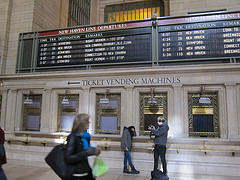6 Travel Money Tips for Your Next Trip Abroad
26 April 2013
Although managing your money while traveling has certainly gotten easier, it still isn’t as simple and safe as you might think.
Many travelers remember when it was necessary to have a stash of traveler’s checks because those were the most secure way to pay for things when you travel, but these days traveler’s checks are hardly recognized much less recognized in most countries (although they’re still considered safe in some places).
You already know the most common strategies:
- Call your bank and let them know where you’re traveling to avoid having your cards locked
- Check the automatic teller machine for signs of tampering before using it
- Cover the keypad when you type in your PIN
- Never keep all your money in one place and use a money belt
- Carry a backup card just in case
So let’s talk about the latest travel money tips from experts.
1. ATMs are still the best choice for getting your cash
Although some banks charge high fees to use foreign ATMs, not to mention adding high foreign-transaction fees, the ATM is still the cheapest way to exchange your money. Those ‘no-fee’ currency exchanges have significantly higher exchange rates. If your bank has international ATMS or partner banks abroad, you can often save on cash withdrawals.
It pays to shop around for a bank if you plan to travel internationally. Be sure to check your daily withdrawal limit if you intend to pay cash for larger expenses, like lodging, while you’re traveling.
2. Use your cards less to guard against identity theft
The less you use your cards – debit and credit – the less likely your information will be stolen and sold as identity theft. In some countries and/or certain areas, it’s not unheard of for vendors to double-swipe your card – that is charge the same transaction twice, taking one as their version of a bonus. It’s also easy enough for someone to record your credit card number for later use of their own.
Using cash wherever possible cuts down on the risk of identity theft.
3. Your credit card costs you more than you think
Many places in foreign countries don’t take credit cards or they’ll tack on extra fees to use your card. Depending on the type of credit card you have, currency conversion surcharges can vary as much as 10% between worst and best cards. Plus, in some countries where chip-and-PIN cards are common, you could find yourself in a place that doesn’t accept your credit card too.
Make your reservations with your credit card and then stick with the cash wherever you can.
4. Assume you’ll be shortchanged or overcharged
Folks who spend hours every day changing money for nameless strangers often have no problem taking a little off the top especially for tourists who don’t understand the local currency. Take the time to learn the local currency – stop by a local bank or ask the concierge at your hotel for a quick lesson – and double-check the amounts you’re being charged and when you get change.
This is easy enough to do using your native currency, so take the time to figure it out or expect to be over charged everywhere you go.
5. Use local cash and enjoy the perks
Many American travelers are happy when they find out that the clerks at their destination accept U.S. money. What they may not know is that the sales clerk is adding as much as 20% to accommodate the store’s private exchange rate. Without knowing it, you’re changing money and at a lousy rate every time you buy with U.S. dollars.
It’s best to hit the airport ATM when you land and load up on local cash instead. You’ll get the best exchange rates and some vendors are even willing to offer a discount for paying with cash. Of course, using cash helps keep your spending and the accrued interest under control.
6. Coins are worthless when you leave the country
In some countries, big-value coins are common and exporting a pocketful of change can be expensive. You’ll have to return to an actual bank state-side to get them converted back to U.S. money and there you’ll pay the expensive exchange rate. So, spend your coins, change them into bills, or give them away before you leave the country.
Note that euro coins are perfectly good in any country that uses euro currency, so you can take those with you when you cross the border into another country.
Damian Tysdal is the founder of CoverTrip, and is a licensed agent for travel insurance (MA 1883287). He believes travel insurance should be easier to understand, and started the first travel insurance blog in 2006.

